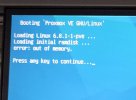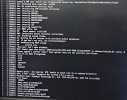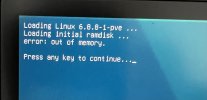Hi everyone.
I have a problem with my Proxmox, everything worked fine and yesterday, after some time, I installed the updates and from that moment Proxmox started to stop responding with a black screen, when I turned it off and on again it worked for a while and then it stop responding again , pve-manager 8.1.10 Linux 6.5.13-5-pve .
Being a masochist, I decided to update the kernel to version 6.8.1-1-pve and it no longer started:

Booting into "Advanced options for Proxmox VE GNU/Linux" I get this error:

The strange thing is that now if I boot with Linux 6.5.13-5-pve everything works.
I ask you:
1) Is there anything I can try to fix the problem?
2) how can I set it to boot automatically with the 6.5.13-5-pve kernel?
Thank you
I have a problem with my Proxmox, everything worked fine and yesterday, after some time, I installed the updates and from that moment Proxmox started to stop responding with a black screen, when I turned it off and on again it worked for a while and then it stop responding again , pve-manager 8.1.10 Linux 6.5.13-5-pve .
Being a masochist, I decided to update the kernel to version 6.8.1-1-pve and it no longer started:

Booting into "Advanced options for Proxmox VE GNU/Linux" I get this error:

The strange thing is that now if I boot with Linux 6.5.13-5-pve everything works.
I ask you:
1) Is there anything I can try to fix the problem?
2) how can I set it to boot automatically with the 6.5.13-5-pve kernel?
Thank you


